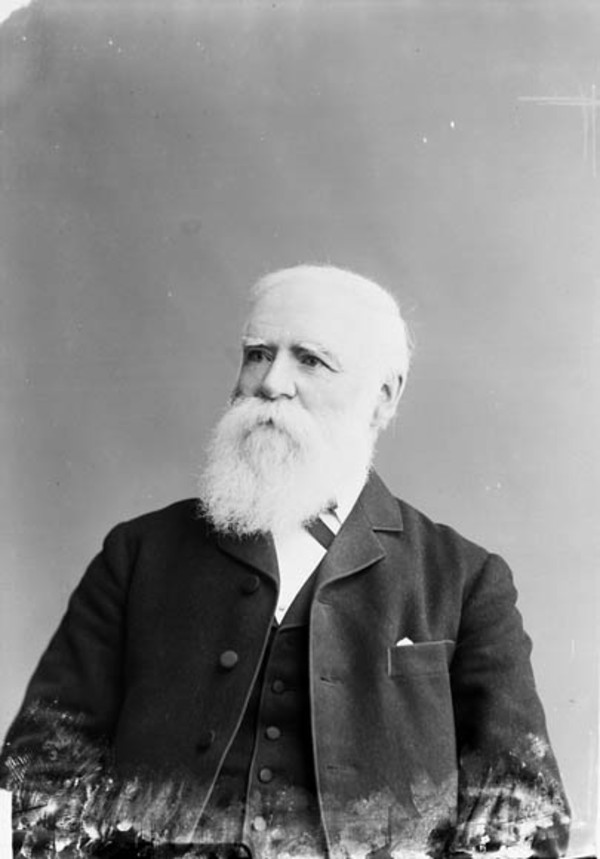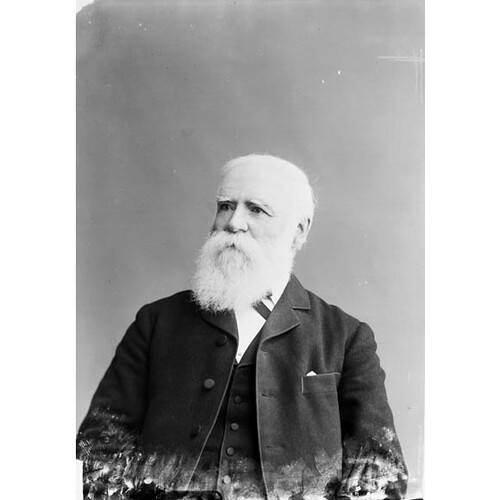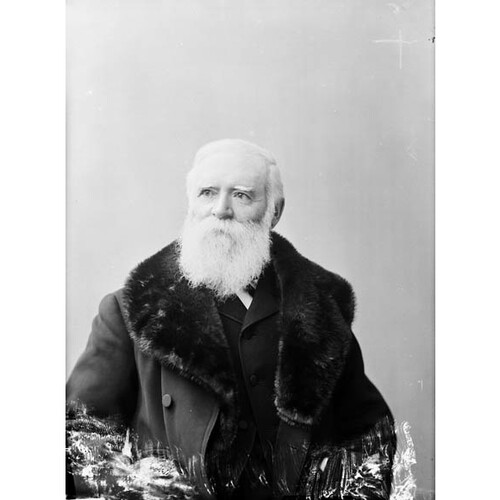ELLIS, JOHN VALENTINE, newspaperman and politician; b. 14 Feb. 1835 in Halifax, son of Michael Ellis and Margaret Mary Walsh; m. 2 Nov. 1864 Mary Caroline Babbitt in Fredericton, and they had at least six sons, one of whom died young, and two daughters; d. 10 July 1913 in Saint John.
An Irish immigrant like his wife, Michael Ellis was employed at the Halifax dockyard, a situation that afforded his son little formal education. As a youth, John Valentine Ellis went to work as a printer at the Halifax Morning Chronicle and then moved on to brief stints in New York and in Montreal as a reporter with the Montreal Herald. In 1857 he arrived in Saint John and found work as a printer, first with Edward Willis* and then at George Edward Fenety*’s Morning News. Fenety appreciated Ellis’s potential and before long the young man was writing occasionally for the News. In 1861 Ellis formed a partnership with Christopher Armstrong and bought the floundering Daily Evening Globe. Under their direction the Globe – renamed the Saint John Globe in 1867 – flourished and became one of the leading Liberal newspapers in the city.
Through its editorial pages, Ellis was to make his political views abundantly clear. He was deeply committed to the principles of British liberalism and, although a supporter of the Liberal party, he felt no obligation to toe the party line. Ellis was considered by friends and foes alike to be an independent thinker and once confided to Wilfrid Laurier that he thought he might be “too radical” for Canadian politics. He advocated such progressive measures as labour unions and a broader franchise which included women’s suffrage.
As the turbulent 1860s began in New Brunswick, Ellis put pen to paper and addressed the issues of the day in his bold and pithy style. Unlike the majority of Maritimers, he supported the North during the American Civil War because he felt that the South posed a threat to human liberty. More important to Ellis, however, was the burning issue of confederation. He saw little merit in the idea of the Maritime provinces joining with Canada and instead supported annexation to the United States. The confederation scheme of 1865, he stated, would only make the Maritimes a “tributary to Canada, and will grind us down to pay her debts.” After it was adopted, Ellis became one of the leaders in 1868 of the newly formed New Brunswick League, which lobbied for repeal of the union.
Ellis’s secessionist and annexationist views led him to run as a federal candidate for Saint John City and County in 1874. His decision to stand split the Liberal party and he was defeated. Two years later he was named postmaster of Saint John by the Liberal government of Alexander Mackenzie*, a post he retained until he was removed by the Conservatives in 1879.
In 1882 Ellis successfully ran in Saint John City as a candidate for provincial office and he was re-elected in 1886. His second term was short-lived: he was obliged to resign because of voting irregularities in his constituency. In February 1887 he decided to try his hand again in the federal arena and this time was successful in Saint John City, winning a number of traditionally Conservative wards. A long-time supporter of reciprocity, he became an outspoken advocate of this policy during his first term in office. When the Liberals lost the 1891 election as a result of their support for reciprocity, so too did Ellis. In 1896 he re-offered as a federal candidate and successfully rode the Liberal wave back to power. Ellis was called to the Senate on 3 Sept. 1900 and served as chairman of its debates committee until his death.
Ellis’s political career was distinguished for the liberal causes he espoused and for his vehement independence, but he is best remembered for an incident which brought into question his journalistic integrity. In the federal election of 1887 there had been great controversy over questionable election practices in Queens County, N.B. On 10 March in the Globe Ellis levelled a blast against judge William Henry Tuck’s handling of the case, stating that “this whole business . . . is a scandal and an outrage of the most abominable character.” Ellis’s most scathing attack came the following day in an editorial headed “Government by fraud” and resulted in his being charged with contempt of court. The case quickly gained prominence and newspaper editors all over Canada registered their support for him. When it was decided in 1889, judgement went against him, but he appealed to the Supreme Court of Canada and proceedings dragged on until 1893. In that year he again enraged the judiciary, by an editorial in which he accused New Brunswick Supreme Court justice Acalus Lockwood Palmer of nepotism and of having accepted a payment of $5,000 in a receivership case.
In October 1893, after the Supreme Court of Canada had quashed his appeal, Ellis appeared again before the New Brunswick Supreme Court, which sentenced him to 30 days in jail, a $200 fine, and costs (which would amount to $3,000). The three judges included Palmer and also John James Fraser*, who had earlier been the butt of criticisms that had led to the imprisonment of journalist John Thomas Hawke* for contempt. The Canadian press was outraged not only by the blatant conflict of interest in the case, but by the clear violation of freedom of the press. Ellis served his jail term and upon his release on 13 November was given a hero’s reception by 10,000 supporters in Saint John. The following year the issue of his punishment occupied two days of debate in the House of Commons, which brought Ellis further into the limelight.
While he was actively involved in journalism and politics, Ellis was also committed to community affairs. He was a member of the Saint John Board of School Trustees and of the senate of the University of New Brunswick, which awarded him an honorary lld in 1897. A patron of numerous charities, he sat on the boards of various local organizations. He was also a prominent fraternalist, having risen to the highest provincial offices in the masonic order, the Independent Order of Odd Fellows, and the Royal Order of Scotland.
Ellis fell ill during the spring session of parliament in 1913 and therefore his death was not unexpected. In the days that followed, the widespread recognition and respect he had achieved were evident in the outpouring of remembrances from editors and politicians all over the country. Perhaps the most concise and fitting tribute came from James Alexander Macdonald*, the editor of the Toronto Globe, who described him as “a man of unblemished character, and high standing in the community, and the editor of a newspaper highly esteemed for its moderation and independence.”
Though a popular speaker throughout New Brunswick, J. V. Ellis published but one essay, New Brunswick as a home for emigrants: with the best means of promoting immigration and developing the resources of the province ([Saint John?], 1860). The only personal papers of Ellis in existence are held in the N.B. Museum and largely consist of a series of lectures he delivered to a number of different audiences. The topics range from great authors such as George Eliot, through freemasonry, to a 1910 “Address to the University of New Brunswick graduating class,” and, of course, a number of political and social issues are addressed.
NA, MG 26, G (mfm. at PANB); MG 27, I, D15. PANB, MC 1156, VII. Evening Times and Star (Saint John), July 1913. Saint John Globe, 1867–1913. St. John Morning Telegraph (Saint John), July 1867, February–March 1868, continued by the Daily Telegraph, January–March 1887, and the Daily Telegraph and the Sun, July 1913. Can., House of Commons, Debates, 1887–88, 1893–94. Canadian men and women of the time (Morgan: 1898). J. A. Cooper, “The editors of the leading Canadian dailies,” Canadian Magazine, 12 (November 1898–April 1899): 336–52. Ex parte Baird: in re Ellis (1888), New Brunswick Reports (Saint John and Fredericton), 27: 99–129. Fate, hope and editorials: contemporary accounts and opinions in the newspapers, 1862–1873, microfilmed by the CLA/ACB Microfilm Project, comp. Helen Elliot (Ottawa, 1967). H. B. Jefferson, “The great Pooh-Bah case” and “The Ellis case,” Atlantic Advocate (Fredericton), 54 (1963–64), no.1: 45–51 and no.7: 46–54, respectively. Regina v. Ellis: ex parte Baird (1889), New Brunswick Reports, 28: 497–550; (1893), 32: 561–65. R. G. Thorne, “Aspects of the political career of J. V. Ellis, 1867–1891” (ma thesis, Univ. of N.B., Fredericton, 1981).
Cite This Article
Jennifer Allaby, “ELLIS, JOHN VALENTINE,” in Dictionary of Canadian Biography, vol. 14, University of Toronto/Université Laval, 2003–, accessed February 13, 2026, https://www.biographi.ca/en/bio/ellis_john_valentine_14E.html.
The citation above shows the format for footnotes and endnotes according to the Chicago manual of style (16th edition). Information to be used in other citation formats:
| Permalink: | https://www.biographi.ca/en/bio/ellis_john_valentine_14E.html |
| Author of Article: | Jennifer Allaby |
| Title of Article: | ELLIS, JOHN VALENTINE |
| Publication Name: | Dictionary of Canadian Biography, vol. 14 |
| Publisher: | University of Toronto/Université Laval |
| Year of publication: | 1998 |
| Year of revision: | 1998 |
| Access Date: | February 13, 2026 |





